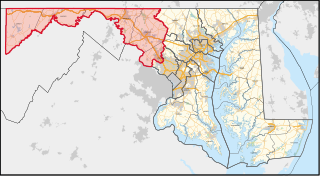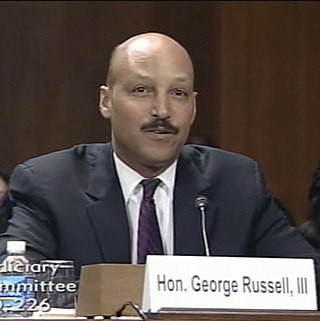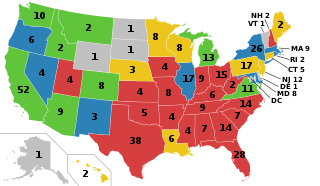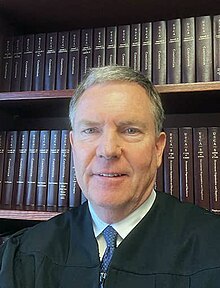
In United States constitutional law,the political questiondoctrine holds that a constitutional dispute that requires knowledge of a non-legal character or the use of techniques not suitable for a court or explicitly assigned by the Constitution to the U.S. Congress,or the President of the United States,lies within the political,rather than the legal,realm to solve,and judges customarily refuse to address such matters. The idea of a political question is closely linked to the concept of justiciability,as it comes down to a question of whether or not the court system is an appropriate forum in which to hear the case. This is because the court system only has the authority to hear and decide a legal question,not a political one. Legal questions are deemed to be justiciable,while political questions are nonjusticiable. One scholar explained:
The political question doctrine holds that some questions,in their nature,are fundamentally political,and not legal,and if a question is fundamentally political ... then the court will refuse to hear that case. It will claim that it doesn't have jurisdiction. And it will leave that question to some other aspect of the political process to settle out.

Samuel Chase was a Founding Father of the United States,signer of the Continental Association and United States Declaration of Independence as a representative of Maryland,and Associate Justice of the United States Supreme Court. In 1804,Chase was impeached by the House of Representatives on grounds of letting his partisan leanings affect his court decisions,but was acquitted the following year by the Senate and remained in office. He is the only United States Supreme Court Justice to have ever been impeached.
Redistricting in the United States is the process of drawing electoral district boundaries. For the United States House of Representatives,and state legislatures,redistricting occurs after each ten-year census.
A consent decree is an agreement or settlement that resolves a dispute between two parties without admission of guilt or liability. Most often it is such a type of settlement in the United States. The plaintiff and the defendant ask the court to enter into their agreement,and the court maintains supervision over the implementation of the decree in monetary exchanges or restructured interactions between parties. It is similar to and sometimes referred to as an antitrust decree,stipulated judgment,or consent judgment. Consent decrees are frequently used by federal courts to ensure that businesses and industries adhere to regulatory laws in areas such as antitrust law,employment discrimination,and environmental regulation.

The government of Maryland is conducted according to the Maryland Constitution. The United States is a federation;consequently,the government of Maryland,like the other 49 state governments,has exclusive authority over matters that lie entirely within the state's borders,except as limited by the Constitution of the United States.

James Andrew Wynn Jr. is an American jurist. He serves as a United States circuit judge of the United States Court of Appeals for the Fourth Circuit and formerly served on both the North Carolina Court of Appeals and the North Carolina Supreme Court.

North Carolina is currently divided into 14 congressional districts,each represented by a member of the United States House of Representatives. After the 2000 census,the number of North Carolina's seats was increased from 12 to 13 due to the state's increase in population. In the 2022 elections,per the 2020 United States census,North Carolina gained one new congressional seat for a total of 14.

Maryland's 6th congressional district elects a representative to the United States House of Representatives from the northwest part of the state. The district comprises all of Garrett,Allegany,Frederick,and Washington counties as well as a portion of Montgomery County. April McClain-Delaney (D) is its current representative.
Ohio's 4th congressional district spans sections of the central part of the state. It is currently represented by Republican Jim Jordan,the current chair of the House Judiciary Committee,who has represented the district since 2007.
Vieth v. Jubelirer,541 U.S. 267 (2004),was a United States Supreme Court ruling that was significant in the area of partisan redistricting and political gerrymandering. The court,in a plurality opinion by Justice Antonin Scalia and joined by Chief Justice William Rehnquist and Justices Sandra Day O'Connor and Clarence Thomas,with Justice Anthony Kennedy concurring in the judgment,upheld the ruling of the District Court in favor of the appellees that the alleged political gerrymandering was not unconstitutional. Subsequent to the ruling,partisan bias in redistricting increased dramatically in the 2010 redistricting round.

Richard D. Bennett is a United States Senior District Judge of the United States District Court for the District of Maryland. Born in Maryland,Bennett is a graduate of Severn School,the University of Pennsylvania,and the University of Maryland Francis King Carey School of Law. He previously served as an Assistant United States Attorney and the United States Attorney for Maryland,and was awarded multiple commendations for his service. In private practice,Bennett was a partner in a major Maryland law firm,where he specialized in white collar criminal defense. Appointed to the federal bench in 2003,he took senior status in 2021. While maintaining an active trial docket in the District of Maryland,Bennett has increasingly been sitting by designation with the United States Court of Appeals for the Ninth Circuit.

George Levi Russell III is the chief United States district judge of the United States District Court for the District of Maryland.

Gerrymandering is the practice of setting boundaries of electoral districts to favor specific political interests within legislative bodies,often resulting in districts with convoluted,winding boundaries rather than compact areas. The term "gerrymandering" was coined after a review of Massachusetts's redistricting maps of 1812 set by Governor Elbridge Gerry noted that one of the districts looked like a mythical salamander.
Shapiro v. McManus,577 U.S. ___ (2015),was a case in which the Supreme Court of the United States clarified when United States District Court judges must refer cases to three-judge panels. In a unanimous opinion written by Justice Antonin Scalia,the Court ruled that federal district courts are required to refer cases to a three-judge panel when plaintiffs challenge the constitutionality of the apportionment of congressional districts.

The 2020 United States redistricting cycle is in progress following the completion of the 2020 United States census. In all fifty states,various bodies are re-drawing state legislative districts. States that are apportioned more than one seat in the United States House of Representatives are also drawing new districts for that legislative body.
Gill v. Whitford,585 U.S. 48 (2018),was a United States Supreme Court case involving the constitutionality of partisan gerrymandering. Other forms of gerrymandering based on racial or ethnic grounds had been deemed unconstitutional,and while the Supreme Court had identified that extreme partisan gerrymandering could also be unconstitutional,the Court had not agreed on how this could be defined,leaving the question to lower courts to decide. That issue was later resolved in Rucho v. Common Cause,in which the Court decided that partisan gerrymanders presented a nonjusticiable political question.
Benisek v. Lamone,585 U.S. ____ (2018),and Lamone v. Benisek,588 U.S. ____ (2019),were a pair of decisions by the Supreme Court of the United States in a case dealing with the topic of partisan gerrymandering arising from the 2011 Democratic party-favored redistricting of Maryland. At the center of the cases was Maryland's 6th district which historically favored Republicans and which was redrawn in 2011 to shift the political majority to become Democratic via vote dilution. Affected voters filed suit,stating that the redistricting violated their right of representation under Article One,Section Two of the U.S. Constitution and freedom of association of the First Amendment.
Rucho v. Common Cause,No. 18-422,588 U.S. 684 (2019) is a landmark case of the United States Supreme Court concerning partisan gerrymandering. The Court ruled that while partisan gerrymandering may be "incompatible with democratic principles",the federal courts cannot review such allegations,as they present nonjusticiable political questions outside the jurisdiction of these courts.

Redistricting in North Carolina has been a controversial topic due to allegations and admissions of gerrymandering.
Moore v. Harper,600 U.S. 1 (2023),is a decision of the Supreme Court of the United States that rejected the independent state legislature theory (ISL),a theory that asserts state legislatures have sole authority to establish election laws for federal elections within their respective states without judicial review by state courts,without presentment to state governors,and without constraint by state constitutions. The case arose from the redistricting of North Carolina's districts by its legislature after the 2020 United States census,which the state courts found to be too artificial and partisan,and an extreme case of gerrymandering in favor of the Republican Party.











